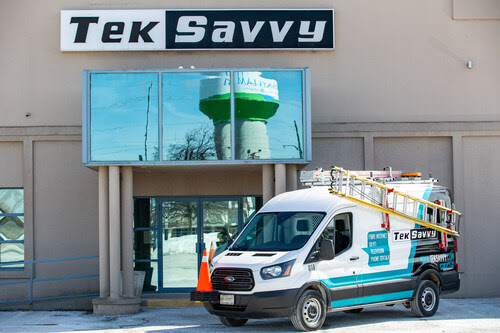
By Ahmad Hathout
The CRTC has ordered Cogeco on Monday to ensure TekSavvy can continue to access its facilities at two Ontario locations the cable provider said it would need to migrate to fibre by May 1.
Cogeco’s transition to fibre facilities would lock TekSavvy and its customers out of locations in Burlington and Windsor – where it uses the Montreal company’s older coax facilities – in part because the commission does not allow mandated access to cablecos’ bundled middle and last mile fibre infrastructure, the Chatham-based company argued in an application in January. TekSavvy also alleged Cogeco has not set up disaggregated access to those fibre facilities in those locations.
Despite Cogeco warning the CRTC about forcing it to maintain its coax facilities or mandate aggregated last mile fibre access in response to TekSavvy’s complaint, the CRTC said it believes that TekSavvy will be irreparably harmed if an interim order in its favour is not granted.
“The loss of service by its subscribers in the Sites would cause irreparable harm to TekSavvy,” the CRTC said in the decision seen by Cartt, but that had not been made public on the regulator’s website by the time of publishing. “Those customers could decide to change providers given that they no longer have access to TekSavvy’s services. Even if TekSavvy were to re-establish service to the Sites, those customers and other potential customers could question the reliability of the service offered by TekSavvy and choose not to return.”
Cogeco claimed in its partly redacted response to TekSavvy’s complaint that, “TekSavvy is not being foreclosed from offering services to its end-customers in either location” by the company, adding TekSavvy is “foreclosing itself by not taking advantage of the services available to it via Cogeco’s TPIA tariff.” It also denied that it doesn’t have disaggregated facilities in any of its operating territory.
Cogeco’s public reply, however, redacts where it has those disaggregated wholesale interconnection locations.
“The record does not show that the necessary disaggregated Points of Interconnection (POIs) have been built or that they could be built and TekSavvy transitioned to those POIs before 1 May 2024,” the CRTC said in its decision.
“While the Commission encourages and supports investment in high-quality networks, ultimately, we have to consider the impact that the decommissioning of these facilities would have on consumer choice and on competitors,” the CRTC said, adding “the Commission notes that providing interim relief in this case does not prevent Cogeco from upgrading its network or offering all of its current or planned services to its customers.”
The regulator is leaving it up to the two telecoms to determine how access at those two locations will be maintained, noting that they are to consider one of three proposals put forward by TekSavvy. That includes halting Cogeco’s removal of coaxial access facilities at the affected sites or require that “the replacement fibre facilities are available to wholesale customers at the current rates of coaxial facilities.”
Cogeco declined to comment.
The CRTC has held that the disaggregated regime, which has some configurations set up in Ontario and Quebec, has “limited viability” as a competitive option for third parties seeking last mile fibre access. The commission in November ruled that competitors should have interim bundled access to Bell’s and Telus’s middle and last mile fibre facilities, which competitors said they are chomping at the bit to access by May 7. The Federal Court of Appeal will review the legal issues surrounding that interim order, which is in place until the CRTC releases its decision on its wholesale internet review.
TekSavvy also requested that the CRTC hold a new proceeding to consider the issue of decommissioning and network upgrade practices that may leave competitors behind. The CRTC, however, denied the request because the issue is current being explored as part of its review of the wholesale internet framework.



